Lobbying Industry Immune to Virus as Spending Spikes to New Highs
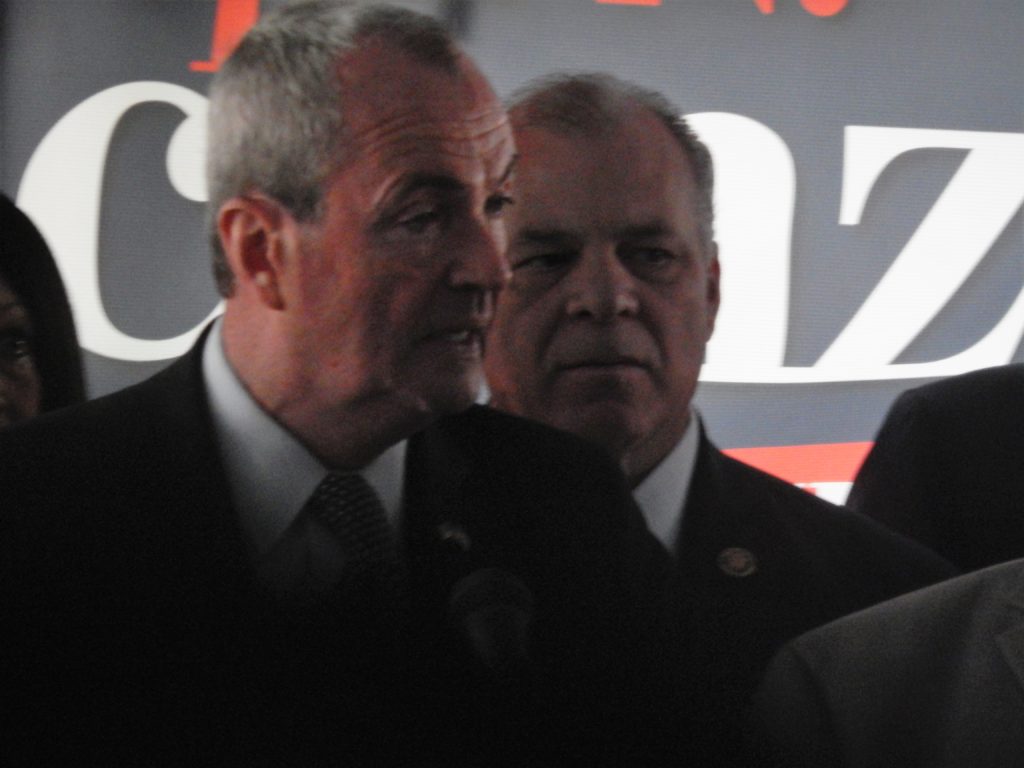
Lobbying expenditures hit a record $105 million in 2020 as lawmakers enacted scores of bills to
address the COVID-19 crisis, marijuana advocates pushed hard for legalization, and a major health insurer secured legislation letting it reorganize, according to annual lobbying reports filed with the New Jersey Election Law Enforcement Commission (ELEC).
Overall spending jumped nearly 3.4 percent from $101.6 million in 2019.

Jeff Brindle, ELEC’s Executive Director, said state government’s response in 2020 to the pandemic health threat was a top concern of lawmakers, executive branch officials and lobbyists.
“State efforts to confront the COVID-19 outbreak were a key factor that drove lobbying expenditures in 2020 to a new record,” said Brindle.
So far, 76 (40 percent) of the 188 laws enacted during the current two-year legislative session were related to the pandemic. The Legislature’s website lists 169 bills that mention COVID-19.
The public health crisis also has sparked an unusual flood of executive orders.
Of the 132 executive orders issued since January 1, 2020 by Governor Phil Murphy, 105 (80 percent) have dealt with the COVID-19 outbreak.
Lobbyists have had to focus not just on legislation but also the executive branch. For instance, lobbyists for New Jersey Education Association (NJEA) met with the Governor’s office over the issue of school openings. “Given the unprecedented nature of this crisis, it follows that there would be a major legislative and executive response as well as heavy engagement by the lobbying community,” said Brindle.
States like Colorado also have reported new highs in lobbying spending due to the legislative reaction to the public health scare.
While the virus crisis was a major priority of state officials and lobbyists last year, Brindle said the push to legalize marijuana in New Jersey also lead to heavy spending.
Preliminary figures indicate pro-marijuana advocates jointly spent at least $1.5 million on lobbying in 2020. Several of the same advocates also contributed most of the $2.3 million spent to secure passage of a legalization ballot question in November 2020. Marijuana backers also contributed $65,000 to other committees and candidates last year.
“The combined $3.9 million in political spending last year was the largest annual total since a bill legalizing medical marijuana in New Jersey took effect in 2010,” Brindle said. Virtually all reported spending during the past decade came from pro-marijuana groups, not opponents, he noted.

“Supporters of legalized marijuana in New Jersey have invested about $6.7 million on lobbying and $3.7 million on contributions since 2010- a total of more than $10 million.” said Brindle. “Obviously, their investment paid off since the state has enacted two medical marijuana laws, a decriminalization bill and a broader legalization bill along with other related legislation.”
The culmination of their efforts came February 22, 2021, when Governor Phil Murphy signed a bill legalizing cannabis for recreational use by adults, making New Jersey the 15ᵗʰ state to do so.¹ Less than a week later, Virginia’s legislature enacted a similar bill.

The biggest supporter of legalized marijuana in New Jersey has been Scotts Miracle-Gro, a lawn and garden company based in Marysville, Ohio. Scotts has become one the biggest mainstream investors in the industry since its CEO declared in a Wall Street Journal interview in 2011 announcing “I want to target the pot market.”³
“As the leading provider of nutrients, plant supplements, growing media, air filtration and lighting used for hydroponic and indoor growing, our company is unique in its ability to help people who choose to produce cannabis authorized under state-law.”⁴ The company noted that, even at this early stage, there are “roughly 15,000 licensed cannabis businesses in the United States, 200,000 people employed in the field, and more than 2 million medical cannabis patients served by the industry.”⁵
Other issues also drew heavy spending in 2020.
NJEA spent $6.3 million shaping several bills critical to its members. The union represents 203,520 teachers and others, and historically has been the largest special interest group in terms of spending.
One of its top priorities was (S-2273/A-20), which overhauls health benefits for teachers at an estimated annual savings of $1 billion. It was unanimously passed in the Legislature and enacted by Governor Murphy July 2, 2020.
Another bill (S-993/A-631) provided non-teaching employees of local, county, or regional school districts the right to dispute disciplinary action through arbitration. It was signed into law on August 13, 2020.
Another big spender last year was New Direction NJ Corp., a 501c4 social welfare non-profit group run by Governor Murphy’s 2017 campaign manager. It spent nearly $5 million primarily on media campaigns promoting the governor’s policy agenda.
Just as some groups have been trying to make marijuana lawful in New Jersey for more than a decade, Horizon Blue Cross Blue Shield of NJ has been trying for many years to revamp its corporate structure.
The company’s efforts finally succeeded when Governor Murphy on December 23, 2020 enacted reorganization legislation (A-5119/S-218).
Horizon boosted its lobbying expenditures 198 percent to $4.3 million in 2020. It contributed $2.8 million to Move Health Care Forward NJ Inc, a group that ran a major advertising blitz for the corporate overhaul.
Done mostly via cable TV and the internet, the media campaign successfully secured approval of legislation letting Horizon convert from a health services corporation to a non-profit holding company.
The health insurer contends the restructuring will allow it to modernize and diversify its business operations.
The lobbying industry’s growing use of internet and traditional communications to build support or opposition to state policies has been a steady trend.
A new peak was reached in 2020 when total communication expenditures topped $18 million- a 32 percent increase over the 2019 total. The top ten spenders made up 93 percent.
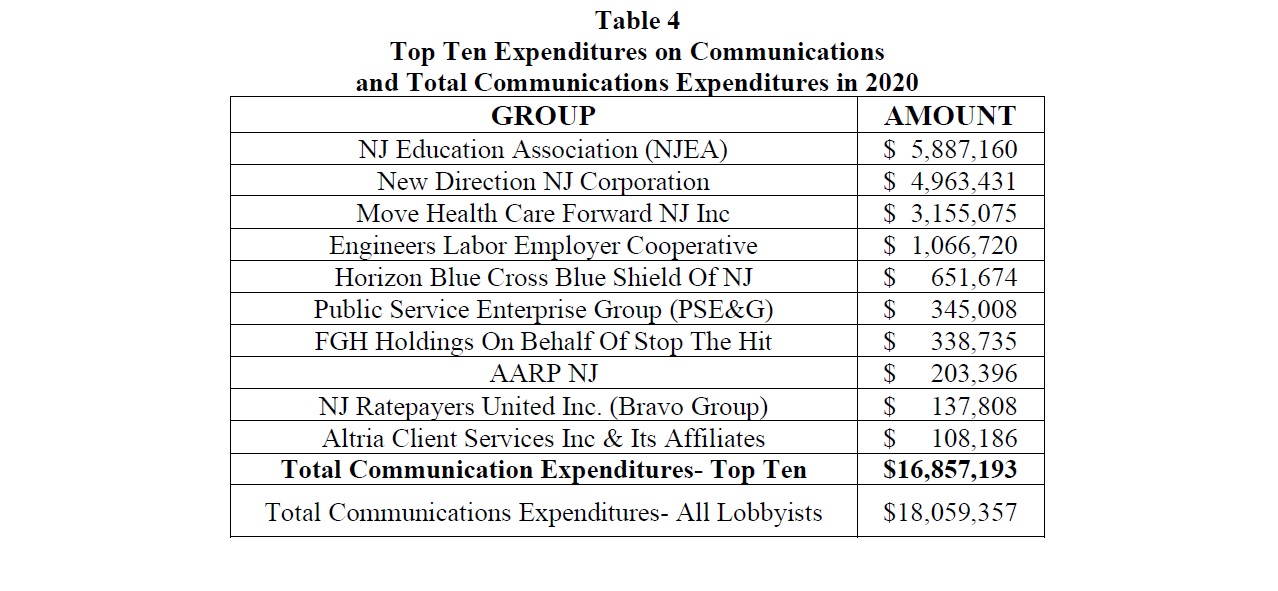
The amount spent on “benefit passing”- gifts like meals, trips or other things of value- dispensed by lobbyists fell in 2020 to $2,783. That is the third smallest sum since the all-time high of $163,375 in 1992.
Of the 862 represented entities who reported spending money on lobbying in 2020, the top 25 alone spent nearly $28.6 million- nearly a third of all lobbying expenditures. Twenty-two groups remain on the list from 2019. Perhaps because nursing homes were a major focus of several COVID-19 bills, NJ Association of Health Care Facilities, which represents the industry, jumped 13 spots to get on the list.
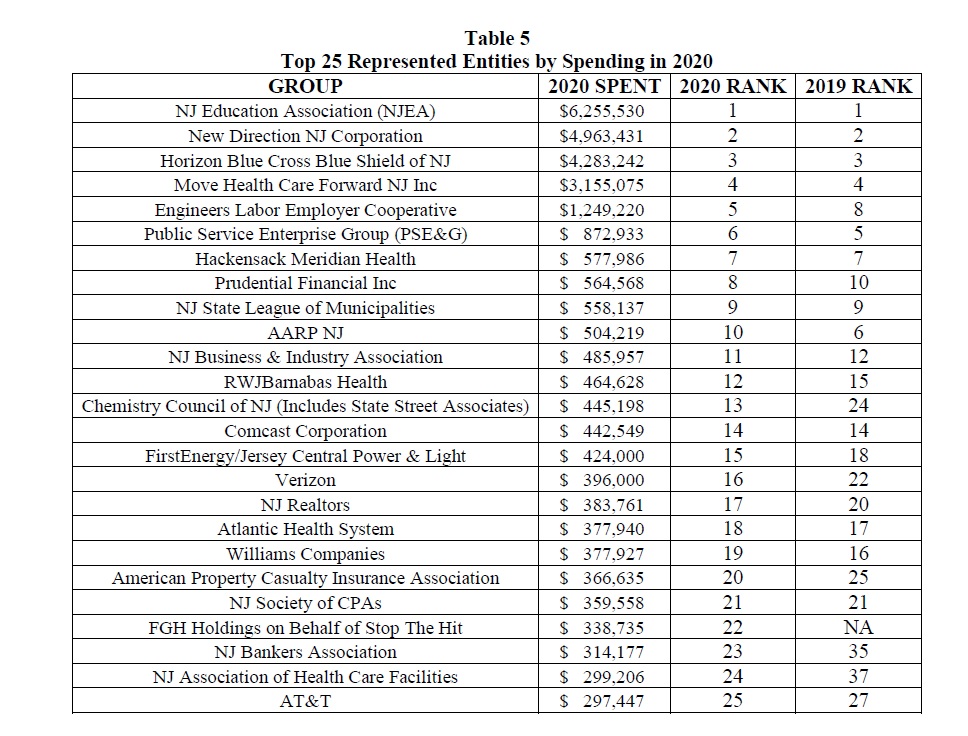
While total spending reached a new high in 2020, the number of lobbyists dipped three percent to 920
from 946 in 2019. The number peaked at 1,043 in 2008.
For the second straight year, lobbyists reported a record number of clients- 2,272- up 2 percent from 2019. Of the nearly $60 million in reported receipts by 78 governmental affairs agents (lobbyists), $38.9 million - 65 percent- went to the top ten multi-client firms.
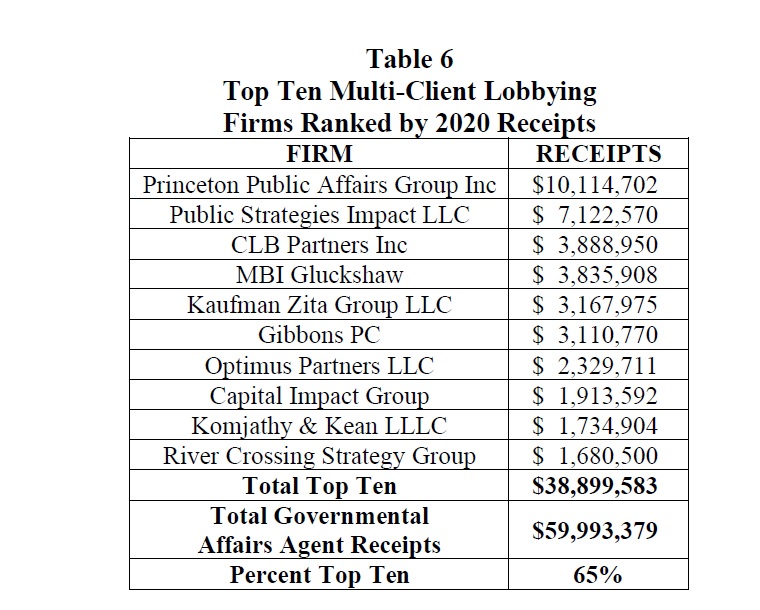
Huge increases in fees and communications offset reductions in other lobbying expenditure categories.
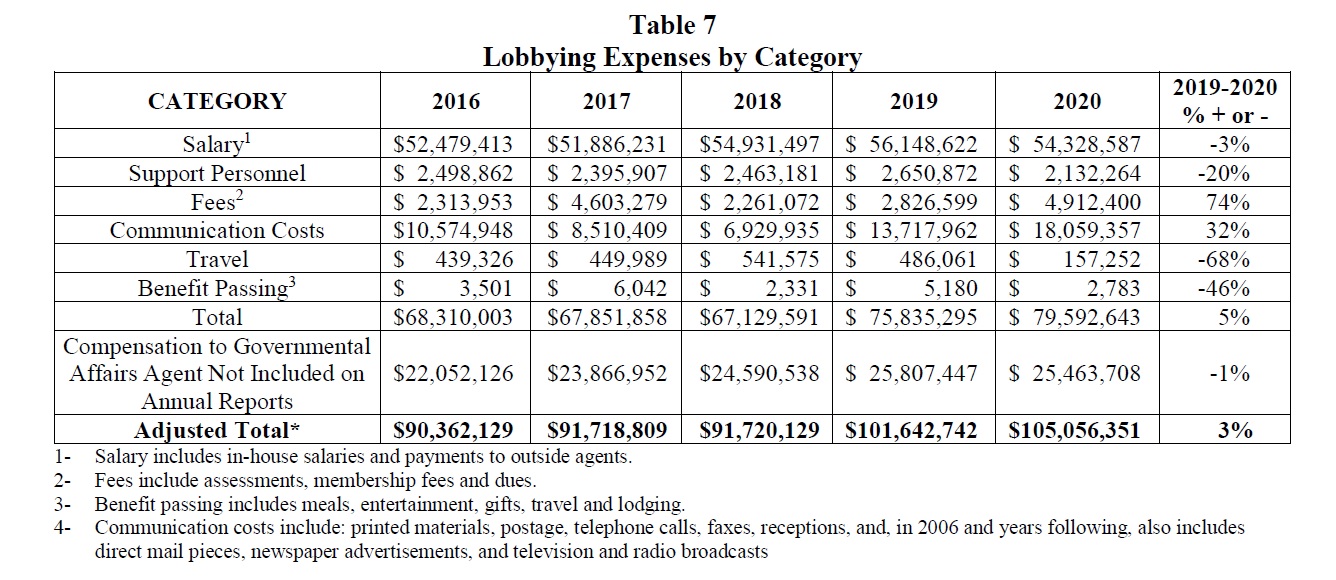
Lobbying summary data shown for 2020 should be considered preliminary.
The analysis reflects a review of reports received as of 5 pm March 5, 2021. In New Jersey, lobbyists who raise or spend more than $2,500 were required to file a report on February 15ᵗʰ that reflects activity from the prior calendar year.
Summary information about lobbyist activities in 2020 can be obtained at the following website: http://www.elec.state.nj.us/publicinformation/gaa_annual.htm. Copies of annual reports also are available on ELEC’s website.





